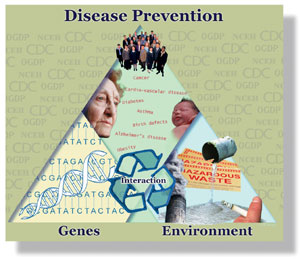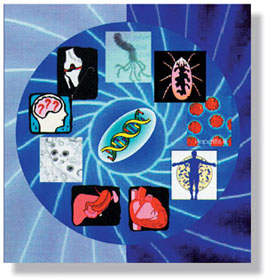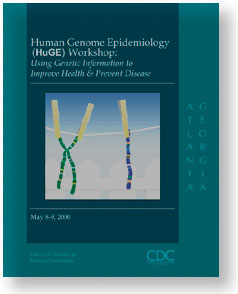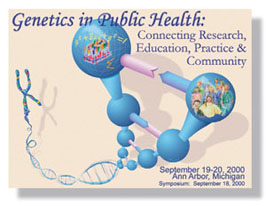| |

|
|

Genetics is about all people, all diseases, and all risk factors. |
Model System for Evaluating Genetic Tests: Awarded a 3-year cooperative funding agreement to the Foundation for Blood Research to develop a model system for assembling, analyzing, disseminating, and updating existing data on the safety and effectiveness of DNA-based genetic tests. This effort will facilitate the appropriate transition of genetic tests from investigational settings to use in clinical and public health practice. The ultimate goal of such a model system is to develop ongoing publicly available information on genetic tests to help develop policies around the appropriate use of genetic information. |
| |
Public Attitudes About Genetic Research: Analyzed data from the 1998 CDC Healthstyles Survey to determine public attitudes about (1) blood storage for future DNA-based research and (2) the relative importance of genetic factors in determining health. Public attitudes will contribute both to methods in recruiting participants for population based genetic studies and to methods of communicating research goals to the public. The results could influence the future course of integrating genetics into public health research.
Extramural Prevention Research: Funded, with support from the Division of Laboratory Sciences at NCEH, a prevention research project entitled "Diabetes Elimination in Washington: Stratified Population Screen." The project is a population-based study of infants with combinations of genetic markers that place them at high risk for developing diabetes. Researchers will measure autoantibodies associated with diabetes and offer subjects the opportunity to enroll in clinical prevention trials designed to interrupt disease progression. Two previously funded projects, "Gene-Environment Interactions in Cardiovascular Disease" (University of Texas) and "Educating Families About Colon Cancer Genetic Risk" (University of Rochester), will continue through 2001. These studies are designed to (1) demonstrate the effectiveness of using genetic information to prevent disease, disability, and death by identifying people at risk and offering appropriate interventions and (2) indicate how genetic information can help target disease prevention efforts by assessing the interaction of modifiable risk factors (e.g., diet, chemical exposures, infections, lifestyle) with known genetic disease risk factors.
|
| |
| Core Genetics Competencies for Public Health: collaborated with the Public Health Practice Program Office to convene 50 tenured public health professionals from state and local health departments, CDC, and other federal agencies to (1) gain a common knowledge base and language of "the intersection of public health and genetics," and (2) produce a draft set of competencies necessary to integrate genetics into the following public health professions: administrators, clinicians, epidemiologists, environmentalists, health educators, and laboratorians. NOPHG currently is synthesizing the collective data into a uniform set of competencies that will enable the public health workforce to begin integrating genetics into public health practice by mid-May 2001. CDC's Office of Workforce Development plans to offer this competency set as a model for integrating new public health concerns, through workforce training, into the 10 essential public health services. |

Genetic factors play a role in all human diseases, including such common chromic diseases as diabetes, cancer, and heart disease. |
| |
Genetics and Public Health Course: Developed and presented a course entitled "Human Genome Epidemiology." The course introduced concepts in human genome epidemiology (HuGE), which translates gene discoveries to disease prevention by integrating population-based data about gene-disease relationships and interventions. Participants acquired conceptual and practical tools for critically evaluating the growing scientific literature in the area of human genetics. Such knowledge should help them integrate human genome data into public health practice.
Genetics and Disease Prevention Weekly Update: Published the weekly "Genetics and Disease Prevention Update" which features current news stories, scientific articles, upcoming events, and other relevant Web links. The Public Health Perspective Page, a new addition to the Update, focuses on a single topic derived from stories reported in the news and scientific journals. The object of the page is to examine current genetic issues from a public health perspective. Readers are presented with a page of information including links to relevant articles, slides, videos, fact sheets, and editorials and are also encouraged to contribute to the discussion on the readers' comment page. The weekly update provides current information in a condensed and organized manner, enhances training, and raises awareness to current genetic issues.
|
| |

In May 2000 CDC presented "The Human Genome Epidemiology Workshop," which introduced participants to epidemiologic approaches for collecting, analyzing, and integrating population data on gene-disease relationships, gene-environment interactions, and targeted interventions.span> |
Human Genome Epidemiology Network: Enhanced the Human Genome Epidemiology Network (HuGENet™), a global collaboration of individuals and organizations committed to developing and disseminating population-based epidemiologic information about the human genome. HuGENet™ membership has increased to 400 members. To date, HuGENet™ has published seven reviews, and eight other reviews have been submitted for publication. Peer-reviewed journal articles of interest to HuGENet™ members are highlighted weekly. HuGENet™ keeps the public health community informed and facilitates the creation of sound policies and programs.
Career Development in Genetics and Public Health: Presented career development awards to five recipients who will serve 3-year assignments in different CDC programs pertaining to genetics. At the conclusion of their assignments, the individuals will be proficient at applying genetic discoveries to public health and are expected to significantly contribute to CDC's strategic goals regarding genetics. |
| |
Maternal Phenylketonuria Study: Collaborated with the Division of Birth Defects, Child Development, and Disability and Health on a maternal phenylketonuria (PKU) study. The study evaluated factors affecting access to and use of a low-phenylalanine diet among women with PKU. Researchers conducted the study in response to a growing concern that the benefits of newborn screening for PKU could be undermined and result in retarded offspring if women with PKU do not have access to a low-phenylalanine diet before and during pregnancy. This investigation helped identify barriers to successful dietary control of phenylalanine levels among childbearing women with PKU. These barriers included factors specific to the diet regimen itself (adverse taste), economic, health care system, and psychosocial issues. Addressing these barriers will enhance a woman's ability to follow medical recommendations and could potentially result in improved pregnancy outcomes for these women.
Textbook on Genetics and Public Health: Edited Genetics and Public Health in the 21st Century: Using Genetic Information to Improve Health and Prevent Disease. The book, published in 2000 by Oxford University Press, is the first comprehensive genetics and public health text and will serve as a reference for professionals who are integrating genetics into public health programs. Portions of the
Book are Available on the NOPHG website. |
| |
| National Conference on Genetics and Public Health: Sponsored the "3rd National Conference on Genetics and Disease Prevention: Connecting Research, Education, Practice & Community, " in collaboration with Association of State and Territorial Health Officials, Health and Human Resources and Services Administration, National Human Genome Research Institute, University of Michigan School of Public Health, and the Michigan Department of Community Health; The conference brought together a variety of health professionals who are involved or interested in genetics at local, state, and national levels. Discussions, workshops, and plenary sessions highlighted the critical issues of how genetic information and technology are impacting all facets of public health including research, education and practice. The result of this exchange of information of ideas and information is a network of informed public health professionals who will be coordinating and implementing future public health genetics policy and programs. |

The third national conference, "Genetics in Public Health--Connecting Research, Education, Practice, and Community," gave public health professionals from all disciplines an opportunity to exchange information and ideas about how to integrate genetics into public health practice. |
|
|
|
Page last reviewed: June 8, 2007 (archived document)
Page last updated: September 10, 2007
Content Source: National Office of Public Health Genomics |
|


